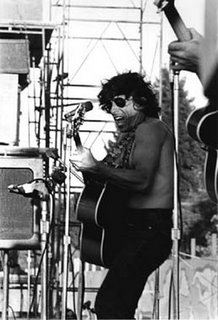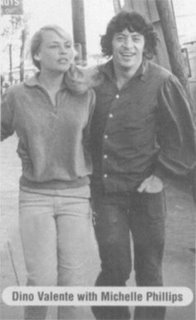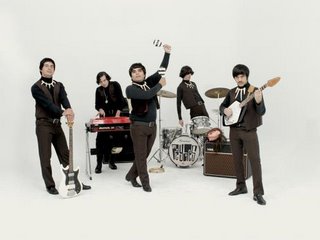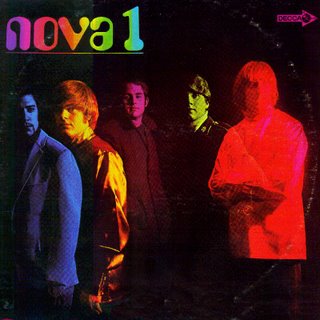27-08-06 - 03-09-06
Saturday, September 02, 2006

Producer: Bob Johnston. Reissue producers: Barry Feldman, Dave Nives.Recorded at Columbia Record Studios, Los Angeles, California from November1967-April 1968. Originally released on Epic (26335). Includes liner notesby Ralph J. Gleason & Arthur Levy.
The 1968 solo album from the Quicksilver Messenger Service lead singer.Moving away from the trademark QMS guitar pyrotechnics, this is a reflective album with a country folky feel that includes a fine version of "Me And My Uncle".Produced by Bob Johnston (the man who oversaw much of Dylan's classic 60's output) it's sound is stripped down to haunting minor acoustic chordsswelled by wads of studio reverb. Chemically deranged b ut incredibly
charming. Fully detailed sleevenotes round off the package with some great shots of Dino busking.
This album typifies the hippie-folk-troubadour syndrome with strumming, everb-laden 12-string guitar and romantic odes of passion and heartbreak. Valente's pliant warble practically floats alone on these 12 strange songs. While this music is folkish in nature, Valente's vocals display an offbeat, almost jazzy inflection reminiscent of the late Tim Buckley.
One of my favourite voices in 60's in an amazing solo effort, with hippy psychedelic touch !
I really enjoy this album !!
Chester William Powers, Jr. (7 August 1943–16 November 1994), better known as Dino Valente, and credited sometimes as Jesse Oris Farrow, was an American singer/songwriter.
 He was born in New York City, and died in Santa Rosa, California. In the early 1960s, while a member of the Greenwich Village folk scene, he wrote "Get Together", a quintessential 1960s love-and-peace anthem, later recorded by Jefferson Airplane, The Youngbloods, and many others. While in Greenwich Village, he played often with singer-songwriter Fred Neil. He was
He was born in New York City, and died in Santa Rosa, California. In the early 1960s, while a member of the Greenwich Village folk scene, he wrote "Get Together", a quintessential 1960s love-and-peace anthem, later recorded by Jefferson Airplane, The Youngbloods, and many others. While in Greenwich Village, he played often with singer-songwriter Fred Neil. He wasan original member of the Quicksilver Messenger Service, but his career was blighted by frequent drug busts. Powers (or one of his pseudonyms) is sometimes erroneously credited as the author of the rock standard "Hey Joe".
 Dino Valenti started out as part of the bi-coastal early '60s folk scene. He befriended and briefly shared a houseboat with David Crosby, and let Mike Clarke accompany him on bongos. During those years, Valenti recorded some songs with Byrds manager Jim Dickson, which led to Dickson recording Crosby.
Dino Valenti started out as part of the bi-coastal early '60s folk scene. He befriended and briefly shared a houseboat with David Crosby, and let Mike Clarke accompany him on bongos. During those years, Valenti recorded some songs with Byrds manager Jim Dickson, which led to Dickson recording Crosby.Around this time, Valenti wrote the folk-rock classic "Get Together," the first song published by Tickson Music, Jim Dickson and Eddie Tickner's music publishing company. The song was a monster hit for the Youngbloods in 1967 and the theme song for the National Conference of Christians and Jews in 1969.
Valenti also copyrighted a version of the song "Hey Joe" under his real name, Chester Powers. Crosby often sang the song with the Byrds, well before they recorded it on Fifth Dimension, and is responsible for popularizing it on the West Coast. In 1964 Valenti helped found the San Francisco band Quicksilver Messenger Service, but he got thrown in jail on a drug bust before they ever recorded.He rejoined them in 1970, just in time for their one big hit, "Fresh Air."
Dino Valente journeyed ahead on Wednesday, November 16, 1994 at home in Santa Rosa, California. He was 57.
PS: If you would like to find out everything about Dino Valente, you could try at this link
http://www.power-pro.com/dinovalenti/gettogether.ht
grab and enjoy !!!

GRAB IT
Friday, September 01, 2006

a library record from a group made up of UK studio musicians, originally released by Peer International in 1971 and licensed to Olympo in Spain.
The original pressing of Big Hammer by The Bigroup has been very much
in demand by crate diggers and progressive rock collectors and one listen to it will tell why - pretty much every track is a killer!
One of the strongest albums in it’s field, choked with goodies: great psych organ mayhem on "Big Hammer", burning acid leads on "Burnilation", sitar action on "Annapurna" plus the ill drum-break of "What’s Coming?" or the dope, stoned ,
beat-heavy "Devil’s Stronghold" & "Heavy Lift"...
I love this LP!
You have just got to hear this LP, it's bloody great!
Highly recommended.
of Europe most of the film and TV industry used music library LPs. These LPs - which were not on sale to the general public - were madeby experienced studio musicians, often recording an album's worth of material in one session, and the music was later matched to the relevant programme.
This remains a rich source of good funky music with albums being made by artists such as Herbie Flowers, Keith Mansfield, Alan Hawkshaw, John Cameron and Eddie Warner.
There are also many useful records for people looking for samples with breaks, percussion tracks and many stripped down versions of tunes with just bass and drums or bass and piano. Often the music was created for a movie; commercial and so on, but when published it was not specifiedon the record. Now often it can't even be traced back.
Apart from the many library LPs which are considered obsolete, some have gained quite a status amongst collectors. Specifically those LPs that were made in specific genres such as the "jazzy groovy beat", the "progressive rock", "the psychedelic folk"...
The Bigroup is one of these bands that did do only 2 albums. Actually 1 album, with two
different titles and labels but the same music. The most collectible one (we leave finding details on the alternative up to you as this is quite a challenge) is the original release on "Peer International" from 1971 (presumably).
This library label actually does have some more collectible releases. Always the details on the release are very scarce and little is known on the musicians. We know the LP was made
by Johnny Scott, aka Patrick J. O'Hara Scott, and some personnel. We
also know is that this LP has nothing but pearls of "Progressive" tracks included with as best track amongst only good tracks : "Heavy Lift".
Peer, as said, is known to be one of these collectible classy library labels but a problem is that all LPs only got very limited pressings.
This LP really has it all : a lot of mistery around the artists, great
music with multi-instruments, heavy rock and fuzz, incredible drum
breaks,... Most prominent instruments are the bass, the hammond and
the drums. It is the bridge between 60's beat and 70's progressive and psychedelic rock.
grab and enjoy it !!!
Thursday, August 31, 2006
Nova Local's Personnel:
PHIL LAMBETH gtr
BILL LEVASSEUR drms
JOE MENDYK ld gtr
JIM OPTON bs
CAM SCHINHAN organ
RANDY WINBURN gtr
ALBUM: 1(A) NOVA I (Decca DL 74977) 1967
NB: (1) issued on MCA (MUPS 377) 1969 in the UK.
45s: 1 Games/If You Only Had The Time (Decca 32138) 1967 2 Other Girls/John Knight's Body (I Wanna Get Out) (Decca 32194) 1967
This band were students at University of North Carolina in Chapel Hill. Their album, which was recorded in New York in December 1966, is definitely worth investigating and is a minor collectable. Its very Anglophile sound garnered it a U.K. release, although the band had split by April 1967.
Bassist Jim Opton told U-Spaces:- "We were a band that was making a pretty good living playing fraternity parties around the campus, and a few cellar clubs in Chapel Hill. My fraternity, Phi Mu Alpha, was sponsoring a charity concert for our scholarship fund, and we decided to go for broke that year and book a big name. We contacted William Morris Agency in New York, and booked Chad and Jeremy. We needed an opening act, so I booked my own band... got us real cheap. The deal was that Rob Heller, who was with the Morris Agency would come and hear us play. He signed us immedately after the concert. A week later he hooked us up with Elliot Mazer, who became our producer. Elliot also worked as a song peddler for E.B. Marks Music, who published the music. We got a recording contract with Decca, I don't know how, but Rob put that deal together with Elliot, and the next thing I know, we are in the studio with all kinds of famous people that had us in awe for the first 35 seconds or so. I do know that somebody thought we were kind of special, because the studio was absolutely closed to visitors while we were there, and we were not allowed to take home raw tape to play for anyone. We did a lot of things that were pretty advanced for our time. Listen carefully to Morning Dew for example. The strange vocal effects were done by feeding the vocals through a Leslie Tone Cabinet from a Hammond B3. Also, the bass lead is the first bass feedback lead I think I can remember in a rock song. I blew up the amp doing it!! Cost me $750 (a LOT of money I didn't have in 1966)!! But, it was a hell of a lick. The album was essentially recorded by five of us: Randy, Bill, Joe, Cam and me. Phil had departed for law school. I believe he is alive and well, and practicing law in Charlotte, N.C."
"Actually, there is one little piece or two of rock and roll history that goes with that album. It was the first ever recorded using the very new, and relatively unknown, Dolby NR System. It took up a good size room at the time. The engineer for the album, Fred Catero, was also the engineer for Simon and Garfunkel."
Joe Mendyk had earlier played in Tri-Power, The Better Days and The Warlocks (with an excellent 45 on Decca). The 'A' side of their first 45, excellent harmony pop-punk, can be heard on Echoes In Time, Vol. 2 (LP) and Echoes In Time Vol's 1 & 2 (CD), the flip is on the album. Forgotten Man, also from the album, has resurfaced on Baubles - Down To Middle Earth (LP).
(Vernon Joynson / Max Waller)
Wednesday, August 30, 2006
ANANDA SHANKAR-And His Music (1975)

What a marvellous exotic album!
Shankar and his Music, by - you guessed it - Ananda Shankar.
Ananda Shankar was Ravi Shankar's Nephew and was one of the first
musicians to mix Indian music with western pop styles back in the
1960s.
Ananda Shankar and his Music expertly mixes 70s funky grooves with
Sitar and Indian instruments. Along with the
fantastic up-tempo numbers, we also get treated to a few lovely tracks
that are more on the chilled side.
Ananda Shankar & his Music became legendary in the 1990s simply
because Capitol picked "Streets of Calcutta" and "Dancing Drums"
for a Blue Note break-beat compilation.
But there is plenty more material of the same caliber, even on that album.
Ananda Sankar (1942 – 1999)

In the late 1960s Shankar travelled to Los Angeles, where he played
with many contemporary musicians including Jimi Hendrix. There he was
signed to Reprise Records and released his first self-titled album in
1970, featuring original Indian classical material alongside
sitar-based cover versions of popular hits such as The Rolling Stones'
Jumpin' Jack Flash and The Doors' Light My Fire. This album has become
an enduring cult classic.
After working in India during the late 1970s and 1980s, Shankar's
profile in the West began to rise again in the mid-1990s as his music
found its way into club DJ sets, particularly in London. His music was
brought to a wider audience with the release of Blue Note Records'
popular 1996 rare groove compilation album, Blue Juice Vol. 1.,
featuring the two standout tracks from Ananda Shankar And His Music,
"Dancing Drums" and "Streets Of Calcutta".
In the late 1990s Shankar worked and toured in the United Kingdom with
London DJ State Of Bengal and others, a collaboration that would
result in the Walking On album, featuring Shankar's trademark sitar
soundscapes mixed with breakbeat and hip hop. Walking On was released
in 2000 after Shankar's sudden death from heart failure the year
before.
To most people, "India's greatest musician" means Pandit Ravi Shankar,
whose ragas briefly pacified the world in the tumultuous 1960s. And
there are those who say Ravi's wife was better than he. But it was
Ravi's nephew Ananda who became the voice of modern India in all its
contrasting elements. In ways never previously imagined --much less
executed even by other master musicians-- he alone merged Indian and
western, classical and rock, lyrical and funky, exotic and commercial,
traditional and progressive. Given the enormity of the task and the
sharp contrast between his success and the failures of so many "raga
rock" practitioners, Ananda Shankar can be seen as one of the greatest
musical figures of the twentieth century.
The son of famous arranger-choreographer Uday Shankar & dancer Amala,
Ananda had all of the expertise, talent, and perfectionists'
dedication of the previous generation. He studied five years under Dr.
Lalmani Misra, head of the Department of Music at Benaras Hindu
University; following his intense tutelage, he spent two years abroad,
where he studied western classical and pop as well as multi-media.
While his ability to perform and compose rivalled that of his famous
father and uncle, he identified more with his own generation.
His 1970 debut album on Reprise featured covers of tunes by the
Rolling Stones and the Doors as well as his own (better) music. The
album's success led to an expansion of his orchestra including dancers
and multi-media effects. His wife Tanusree choreographed. After his
first Indian LP was released, Ananda's music became a fixture on
radio, television, and in theatre. Airlines, fashion shows, and the
film industry recognized his as the modern sound of India. Even years
after his death, his music can be heard at least on U.S. radio and in
fashion shows, thanks largely to a reissue and a compilation.
Ananda was the great modernizer of Indian music, as influential as
Mighty Sparrow and Kui Lee were in updating and promoting their
respective traditions. He won the Indian equivalent of a Grammy Award
for the score of "Chorus" in 1974. Other soundtracks featuring his
work may have been released in India. Throughout his career, his sound
remained fairly consistent, and his vision never flagged until his
untimely death. Yet India and the world still have not completely
caught on to his talent and significance.
Ananda Shankar & his Music became legendary in the 1990s simply
because Capitol picked "Streets of Calcutta" and "Dancing Drums" for a
Blue Note break-beat compilation. But there is plenty more material of
the same caliber, even on that album. Later, rarer albums yield even
more impressive music, and there are plenty of tracks waiting to be
discovered and played by adventurous DJs. Sa-Re-Ga Machan, a funky,
strange, and exotic madhouse ("Jungle King" even reprises "Streets of
Calcutta" a bit), may be the true masterpiece.
The beat of the tabla is as vital to Indian music as the conga to
African and Latin. While the Moog, sitar, and Western themes
distinguish Shankar's music as fresh and original, the cacaphony of
tabla beats grounds the music in simmering Bombay, timeless ragas, and
the splendor of Shankar musical royalty. In other places, such as the
Missing You tribute to Uday, Ananda uses vibes and flute to great
effect. And still elsewhere the elements of Indian soundtracks, such
as occasional female voice and strings, add power and excitement.
Call it futuristic exoticism or Indian soul music. Like other examples
of the best revolutionary music, the wonders of Ananda Shankar will
sound forever ahead of their time: definitely far out, and yet as
familiar and comforting as Mom's cooking.
grab and enjoy it !!!
Monday, August 28, 2006
(Canadian psychedelia)

RICK ASTON (bass),
JED MacKAY (organ, piano),
RICK McKIM (drums),
WAYNE ROWORTH (guitar)
NORM WHITE (guitar)
This package is an excellent example of early 70's keyboard-dominated psychedelia, garage punk, and haunting keyboard sounds.The sound of this reissue has been digitally remastered and for the most part it appears to have been taken from a vinyl source as there is an occasional vinyl static in places. Overall the sound quality is fairly good. Considering the rarity of the original "It's All Meat" album this release is welcomed by any fan of the early 70's garage and psychedelic sounds.
Sunday, August 27, 2006
(Havoc records,HJH 2)

SIDE 1 :
1. Love Won't Stop (R.Van Leeuwen)
2. I've Waited So Long (R.Van Leeuwen)
3. I'll Follow The Sun (R.Van Leeuwen)
4. The Girl From New York City (J.Taylor)
5. You Bother Me (R.Van Leeuwen)
6. I Want Someone Love (R.Van Leeuwen)
SIDE 2:
1. It's Gone (R.Van Leeuwen)
2. No matter Where You Run (R.Van Leeuwen)
3. Be The Woman I Need (R.Van Leeuwen)
4. I've Got Misery (R.Van Leeuwen)
5. Who'll Save My Soul (R.Van Leeuwen)
6. For Another Man (R.Van Leeuwen)
Great debut LP of the dutch Motions featuring future Shocking Blue guy Robbie van Leeuwen.
Included mix of beat, garage and moody tunes that consist of one of the superb albums in all over the world 60's music area !
Although the group disbanded in 1971, the most imporant members have met each other again and again in new groups such as Crossroad, Greenhorn, Jupiter and Galaxy Lin.
From 1964 till 1967, the line-up remained the same: Rudy Bennett (i.r.l. Ruud van de Berg - vocals, earlier as Ritchie Clark and the Ricochets), Robbie van Leeuwen (guitar, ex-Atmospheres & Ricochets, later the founder of both Shocking Blue and Galaxy Lin), Henk Smitskamp (bass, ex-Willy & Giants, later to Livin' Blues) & Sieb Warner (drums, ex-Ricochets, later to Golden Earrings).
In 1967, Robbie left to form Shocking Blue and was replaced by Leo Bennink (ex-Mack); Henk was replaced by Gerard Romeyn (ex-Tee-Set, later with Nico Haak, Image), who, in turn, was replaced by Paul van Melzen (ex-Haigs, later in the Mailer McKenzie Band) after just six months. The last line-up of the group (up 'til 1971) was: Rudy, Leo, Jan Vennik (sax, flute & organ, ex-Jayjays, later to Rob Hoeke & Ekseption), Han Cooper (organ, bass & vocals, ex-Bobby Green Selection, later with Leo, to Fisher & Friends) and Bobby Green (drums, ex-Bobby Green Selection, also to Fisher & Friends).
After the breakup, Rudy Bennett, Bobby Green & Gerard Romeyn all released solo singles.
This vinyl ripped by Optical Sound in bitrate of 256
grab and enjoy it !!!
LOS PEYOTES- Cavernvcolas (2006)

Oscar Hechomierda: bajo y coros
Pablo Peyote: baterνa y coros
Quique Melena: teclados
Rolando Bruno: guitarra y coros
1.I caverman and you?
2.Fuego
3.Cry baby
4.Mocker
5.Satanic rite
6.El humo te hace mal
7.When I arrive
8.Jack the ripper
9.Te pegaré
10.The brotherhood
11.I don't mind
12.The Witch + bonus track Scream
Psychotic Reaction, 2002
Sudamerican Garage Punk (EP), 2003
Cavernvcolas, 2006

